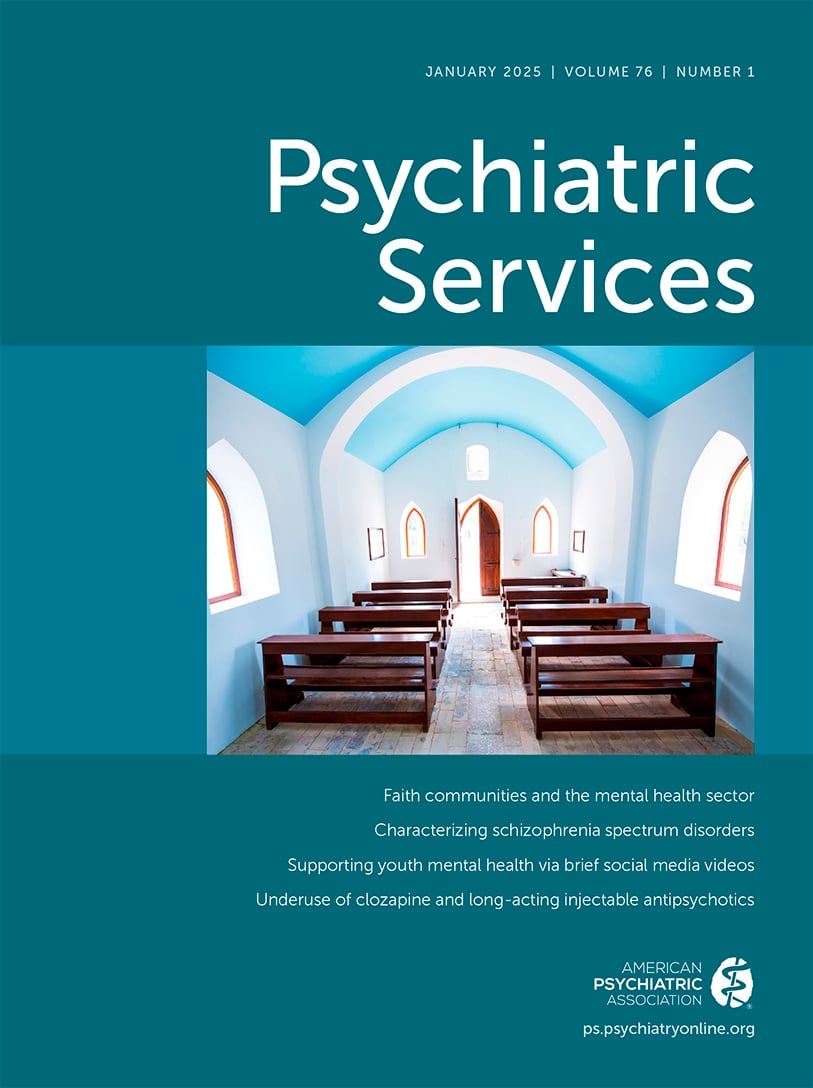Psychiatric Services
- Volume 70
- Number 3
- March 2019
Taking Issue
Viewpoint
Articles
Publication date: 30 November 2018
Pages168–175Objective: Mental health treatment access and quality are influenced by the interplay of structural, organizational, and performance factors—including the number of mental health staff providing direct clinical care relative to patients treated (i.e., ...
https://doi.org/10.1176/appi.ps.201800229Publication date: 10 December 2018
Pages176–183Objective: Individuals with psychotic disorders are at high risk of suicidal behavior. The study examined whether response to item 9 of the Patient Health Questionnaire (PHQ-9), which asks about thoughts of death or self-harm, predicts suicidal behavior ...
https://doi.org/10.1176/appi.ps.201800381Publication date: 17 December 2018
Pages184–190Objective: This study elicited factors that shaped treatment decision making for young adults and their key supporters after an initial hospitalization for psychosis to generate hypotheses about how to improve service engagement. Methods: This prospective, ...
https://doi.org/10.1176/appi.ps.201700459Publication date: 11 January 2019
Pages191–201Objective: Self-directed care allows individuals with disabilities and elderly persons to control public funds to purchase goods and services that help them remain outside institutional settings. This study examined effects on outcomes, service costs, and ...
https://doi.org/10.1176/appi.ps.201800337Publication date: 03 January 2019
Pages202–208Objective: Involvement with child protective services (CPS) can have detrimental effects on children and parents alike. This study provided updated information about the prevalence of parenting among individuals with a serious mental illness and ...
https://doi.org/10.1176/appi.ps.201800277Publication date: 03 January 2019
Pages211–218Objective: Effective mental health services for emerging adults are needed. This work evaluated the logic model of one such program and assessed participation and medium-term outcomes. Methods: Baseline data were collected from 398 emerging adults attending ...
https://doi.org/10.1176/appi.ps.201800219Publication date: 03 January 2019
Pages219–224Objective: Few individuals with mood disorders have access to evidence-based collaborative chronic care models (CCMs) because most patients are seen in small-group practices (<20 providers) with limited capacity to deliver CCMs. In this single-blind ...
https://doi.org/10.1176/appi.ps.201800336Brief Reports
Publication date: 17 January 2019
Pages225–228Objective: The study evaluated a telephone call and text message intervention to improve adherence to medication among patients with severe mental illness. Methods: A randomized clinical trial was conducted, and outpatients with schizophrenia or bipolar ...
https://doi.org/10.1176/appi.ps.201800286Publication date: 11 January 2019
Pages229–232Objective: Specialty addiction programs treat people who are addicted to alcohol, opioids, stimulants, and other drugs. This study identified the proportion of addiction program clients who received tobacco-related services and factors associated with ...
https://doi.org/10.1176/appi.ps.201700565Commentary
Open Forum
Publication date: 05 February 2019
Pages234–236Frequent calls for changing diagnostic labels to decrease stigma may result in unintended consequences. Condemning incorrect language by policing word choice oversimplifies the depth of work involved to increase opportunities for people with mental ...
https://doi.org/10.1176/appi.ps.201800369Personal Accounts
State Mental Health Policy
Publication date: 17 December 2018
Pages239–242In rural communities, primary care providers continue to provide mental health services, and about 70% of children and adolescents identified to have a psychiatric disorder never receive treatment. A telehealth model for providing integrated mental health ...
https://doi.org/10.1176/appi.ps.201800252Global Mental Health Reforms
Publication date: 30 November 2018
Pages243–246Worldwide, attention to mental disorders lags far behind the staggering morbidity attributed to them. In low-resource settings, the majority of people with serious mental illness go untreated, and a major reason for this treatment gap is the worldwide ...
https://doi.org/10.1176/appi.ps.201800363Research, Community, & Services Partnerships
Publication date: 11 January 2019
Pages247–249The New York State Medicaid program is pursuing reforms that would shift reimbursement from fee-for-service to value-based models. Behavioral health populations and services are key to these reforms, but important gaps exist in the breadth and relevance ...
https://doi.org/10.1176/appi.ps.201800256Culture & Mental Health Services
Publication date: 29 January 2019
Pages250–253A myriad of cultural and language-related factors can affect the communication between clinicians, interpreters, and patients. Misunderstandings can lead to diagnostic errors; inadequate treatment; disengagement; and, thereby, poor clinical outcomes. A ...
https://doi.org/10.1176/appi.ps.201800107Letters
Past Issues
View Issues Archive
Vol. 76 | No. 2

Vol. 76 | No. 1

Vol. 75 | No. 12
